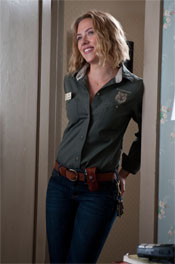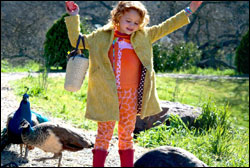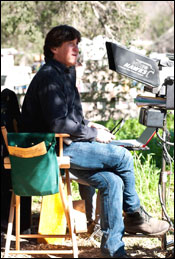There’s a moment in director Cameron Crowe’s We Bought a Zoo that’s indicative of the whole. A character asks a man why he—with no experience with animals or with running a business—bought a failed zoo. His flippant answer: “Why not?” It is clichéd and tired dialogue. But it works because it’s delivered by Matt Damon with a deep, glowing satisfaction as if he just discovered something about himself. It’s a smirk that suggests he just told himself a joke, or that there’s something deeper to these two words. This ho-hum screenwriting works because Damon makes it work.
The same could be said for the movie overall. Damon—along with the acting of the core cast—holds together a disjointed movie that’s not sure if it wants to be whimsical fantasy or poignant realism. It cycles between goofy, mass-appeal family comedy and more mature, personal drama exploring classic Crowe (Almost Famous, Jerry Maguire, Say Anything) themes of grief, finding oneself, growing up and moving on. It is two movies mashed into one. As such, some aspects don’t work. Still, the movie stays enjoyable thanks to the acting and genuine heart.
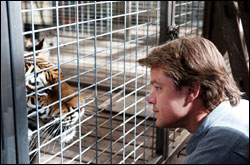 DF-26396 Matt Damon gets up close and personal with one of his new four-legged neighbors, in WE BOUGHT A ZOO. ??????????????????????????????????????????????????????????????????????????????????????????????????????????????
DF-26396 Matt Damon gets up close and personal with one of his new four-legged neighbors, in WE BOUGHT A ZOO. ??????????????????????????????????????????????????????????????????????????????????????????????????????????????Damon plays Benjamin Mee, a newspaper writer addicted to danger and adventure—but not quite ready for his newest journey. When his beloved wife dies of illness, Benjamin is now the single dad of two: 14-year-old Dylan (Colin Ford) and 7-year-old Rosie (adorable Maggie Elizabeth Jones). All three need a new start. It comes in the form of a new house, which just so happens to have a rundown zoo in the backyard. With Benjamin’s brother Duncan (a very likable and grounded Thomas Hayden Church), the young zookeeper Kelly (a strong and dynamic Scarlett Johansson) and a small staff, the Mees have to rehabilitate the zoo before heavy costs ruin them.
When Benjamin makes the decision to buy the zoo—as he lovingly watches Rosie play with peacocks—I found myself only really swallowing this far-fetched premise because it is based on a true story. Otherwise, who would believe that a guy searching for a nice 3-bedroom with plenty of storage space would say yes to an as-is clause that involves lions, tigers, and bears? (Not to mention a far steeper price tag and hefty maintenance costs.)
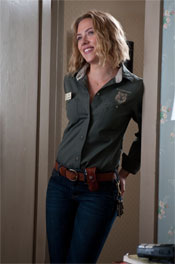 DF-43882.dng
DF-43882.dngWhile the “based on a true story” tag helped me believe his bizarre decision, it turns out that the story of the real Dartmoor Zoological Park (in England) and the fictional one in this film (in California) only really share one plot point: a family bought a zoo. That’s typical with movies inspired by real events. But the deviation from the source material here may point to an underlying issue with the film: The makers didn’t quite know what to do with this story. A family buying a zoo? Cool! Then what? Is there a love story? Can there be a bad guy? Who is this movie for? As the filmmakers tried to answer these questions, they left the movie with some odd tone shifts. As if the studio and director had different ideas. Or the original script was heavily—but not completely—reworked by Crowe to make it something more than generic family comedy.
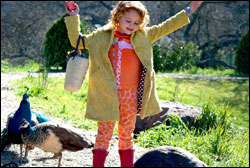
The tonal shifts trickle into the acting as well. The core cast—the Mees family and Johansson—often seem to be acting in a different movie than the side characters. When the film is focused on the core people, the movie is largely character-driven, personal and emotional. But when the goofy side characters—like a ridiculously over-the-top zoo inspector—show up, the film practically turns into farce. Thankfully, the main characters are casted so well—and have such great chemistry—that they shine above the flaws. And the script does a great job developing and resolving some tricky relationships, namely between Benjamin and son Dylan, and between Benjamin and zookeeper Kelly.
Zoo works best when it stops trying so hard to entertain us and just organically lets emotion and character play capture the viewer. There are some very real, powerful moments of happiness and sadness, hope and loss, buried anger and tender comfort.
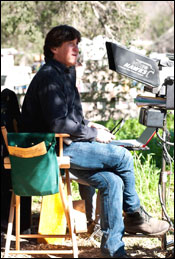 DF-09921.DNG
DF-09921.DNGWhile covered in the inspirational skin of the zoo story, Crowe is really telling the story of a man who can’t get over his wife’s death. That arc is moving and emotive. Benjamin is sick of sympathy but can’t move on. He wants to live his life, but is stuck in his past. He struggles with his brother’s simple advice of: “Sunlight. Human Interaction. Joy.”
In the end, I think Crowe wanted to use this weird story of an unqualified, unprepared family buying a zoo to show how families grieve and heal. How they let go but remember. How they start over—but still look back. How their stories are one full narrative—and not just happy parts that they’d choose to re-read. And how they stick together even when they don’t like each other.
This family bought a zoo but all families take on obstacles they never imagined and aren’t ready for. And they survive them—sick tigers, depressed bears, and all—because they are together.
Talk About It
Discussion starters- What do you make of Dylan’s grief journey? Is he, as Benjamin charges, choosing not to be happy? Is happiness always a choice? What is the difference between happiness and joy?
- When have you had to muster up “20 seconds of embarrassing bravery”? In the film, this concept is applied only to asking out girls. But what other situations could it apply to?
- Benjamin tells Dylan, “I can force a dream on you because is it a good dream!” When do parents need to let their children have their own dreams? How is that line drawn?
- A character says, “If you do something for the right reasons, nothing can stop you.” How does this idea line up with scriptural principles?
The Family Corner
For parents to considerWe Bought a Zoo is rated PG for language and some thematic elements. This film could have easily been given a PG-13 rating because it deals pretty candidly with thematic stuff that kids may find difficult, including the death of a parent. It is not all fun animal stuff but has several scenes of tough family issues. There are a handful of uses of profanity, some of it by children. Also, characters have to make a difficult decision about whether to euthanize an aging, ailing tiger; it’s discussed pretty vaguely and nothing traumatic is shown.
Photos © 20th Century Fox
Copyright © 2011 Christianity Today. Click for reprint information.


